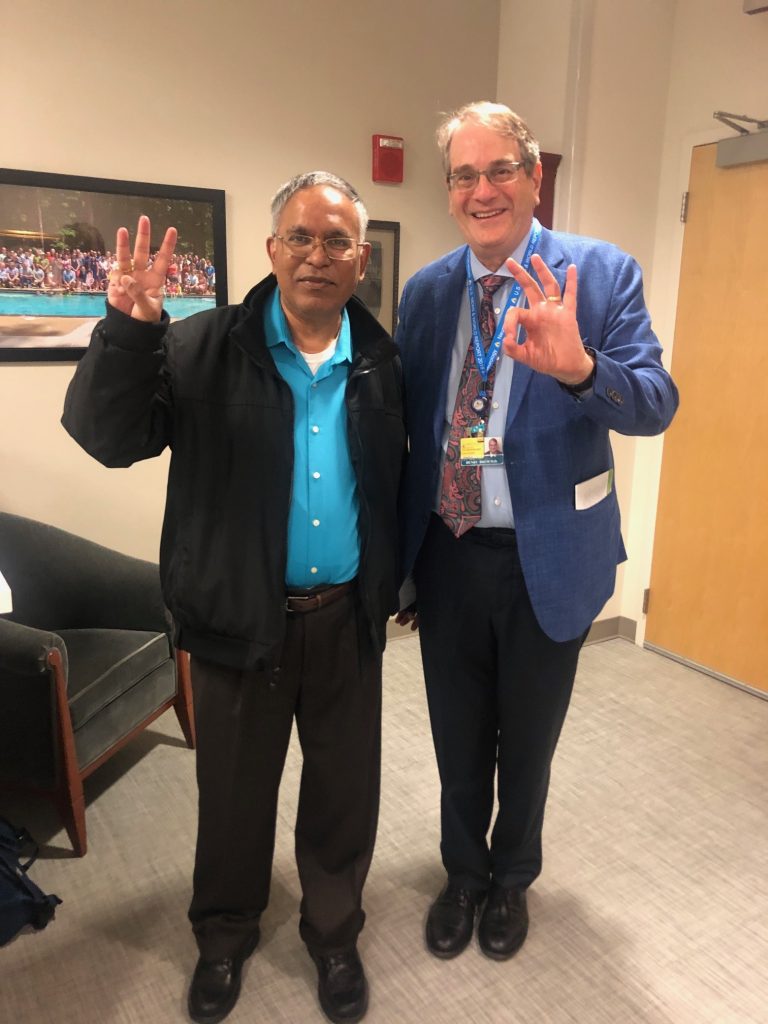There is no nobler thing to do than giving to others and see others happy. … That’s the least I could do for what they provided me.”
Prasad Inmula Glioblastoma survivor and patient of Dr. Henry Brem
In 2009, on the 20th anniversary of a lifesaving surgery to remove a fast-growing brain tumor, Prasad Inmula presented his surgeon, Dr. Henry Brem, with a pen.
“I was thinking, ‘What can I buy as a gift for him?’” Inmula remembers, adding he got the idea for the pen while parking in the Johns Hopkins Hospital deck on the way to an appointment. As he closed the car door, he caught sight of a pen. “It was almost serendipity.”
Now Brem, the director of the Johns Hopkins Department of Neurosurgery, uses the Montblanc Inmula gifted to him to sign the contracts of new faculty in the department. It reminds Brem of Inmula, who was diagnosed with a glioblastoma brain tumor in 1989, and serves as an exemplar of the work they do every day: saving patients from seemingly incurable diseases.

“It’s symbolic to me of a survivor. That this disease is not hopeless, but that we have to just figure out how to make everybody like Inmula,” Brem says. “It’s an academic and clinical goal for the neurosurgery department. And so I say, ‘Symbolically, use his pen to sign your contract, because that’s what I want you to do — have more patients like him.’”
Inmula returns to Hopkins annually for an MRI to check if the tumor has returned, making the trip for many years until recently from Atlanta. With each visit, he makes a monetary gift. Some gifts are larger to correspond with survival milestone years, but most are around $1,000.
“There is no nobler thing to do than giving to others and see others happy,” Inmula says, adding giving is a habit he learned from his parents in India. “I started from Year One and continued until recently. That’s the least I could do for what they provided me.”
Inmula’s gifts over the last 30 years have added up to a significant amount of funding for brain tumor research at Hopkins. The funds have helped purchase laboratory supplies and new drugs for testing, fueling the development of new drug delivery devices. Gifts like Inmula’s also help hire technicians and provide stipends for students to work in Brem’s lab. Each new person is vital to Brem’s work to produce more effective treatments for brain tumors.
There is no nobler thing to do than giving to others and see others happy. … That’s the least I could do for what they provided me.”
Prasad Inmula Glioblastoma survivor and patient of Dr. Henry Brem
Though the median survival rate for a patient with a glioblastoma is now more than 20 months, when Inmula was diagnosed, it was less than half that time. Most died within two years, Brem says, and there were no long-term survivors.
“At that time we were giving systemic chemotherapy, which doesn’t have a statistically significant improvement in overall survival,” Brem says. “In [Inmula’s] case, the surgery was complete and the radiation seemed to finish the job. … But [that’s] very unusual. Very, very unusual.”
Inmula has taken full advantage of his unusual circumstance. In the more than three decades since the surgery, Inmula has worked as a FEMA engineer, gotten married, and raised a family. He credits his wife Kamala and daughters Nandini and Krishna with providing “the support I needed all along.”
The Inmula and Brem families have also grown close over the years, celebrating Inmula’s survival milestones together. In 2010, 21 years after his surgery, members of the two families met in Washington, D.C., for a mile-long walk along the Potomac River organized by Voices Against Brain Cancer. There, Inmula was “humbled and moved” to be presented the Courage Award in honor of his survival. He, in turn, gave the statuette to Brem to display in his office with the hope that it will inspire Brem’s patients.
“What more can I give to Brem who gave me life itself?” Inmula says he often wonders.
Inmula is grateful for Brem’s saving his life, and he feels that a reason for his exceptional recovery is to serve God in service to humanity. He also hopes to help many glioblastoma patients to live a happy life.
“We rechecked this pathology. We rechecked his scans and the tumor never came back,” Brem says. “He’s lived this incredibly wonderful life. … And he keeps wanting to donate to help other people.”
Topics: Johns Hopkins Medicine, Neurosurgery, Fuel Discovery, Promote and Protect Health